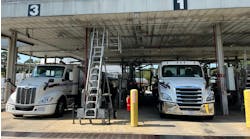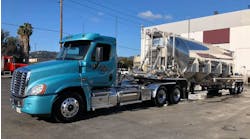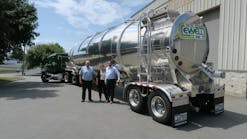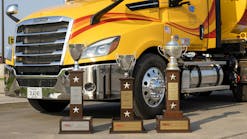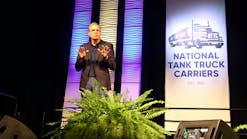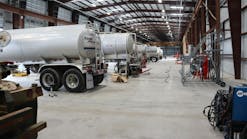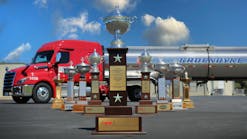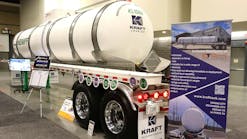It would be a gross understatement to say that Bernard Gorski’s year as chairman of National Tank Truck Carriers did not go as expected.
Gorski, 2019-2020 chairman of National Tank Truck Carriers Inc, says he was honored to lead the association during its 75th anniversary year, and he was looking forward to the gala celebration that was set for May 3-5 in Washington DC. When Gorski assumed the chairman’s mantle, the economy was strong and many tank truck carriers were running hot. It all changed in a heartbeat just weeks before the NTTC annual meeting when the economies of Canada and the United States were brought to a jolting halt by the COVID-19 pandemic.
“It’s an unreal feeling to be chairman during these trying times,” Gorski says. “We had to cancel the annual meeting. We’re still not sure whether we will have to cancel the Safety & Security Council Annual Meeting and the Summer Membership & Board Meeting.
I don’t know how far we will have to go in terms of changes to the plans we had for NTTC events this year, but we will do whatever it takes to keep our people safe. Safety is, after all, one of the pillars of our operation.
“I believe we will successfully survive this event, but there may be some long term changes in the way we live and do business. I believe we will see a continued focus on social distancing, more health security, and a greater focus on keeping things clean and sanitary.”
Asked how the tank truck industry is weathering the COVID-19 pandemic, Gorski says: “I have heard from Dan Furth (NTTC president) that the tank truck industry has seen a 30% to 35% drop in business across the board. Fuel haulers have been especially hard hit because the general public is not driving as much and the airlines have made significant cuts in operations.”
Is this the worst crisis the tank truck industry has faced? Gorski says “It is too early to tell but it is shaping up that way. Our industry has faced and overcame many serious crises over its history. Some examples of difficult times were when the trucking industry was deregulated, the 1983 recession, and the Great Recession of 2008.”
Gorski dealt with many of those events as part of Gorski Bulk Transport, the tank truck carrier that was established by his parents, Ted and Lottie Gorski in 1957. Bernard and his brother Ted bought the company from their parents in 1999. Today, the carrier is part of TFI International.
Based in Oldcastle, a suburb of Windsor, Ontario, Canada, Gorski Bulk started out with two trucks hauling liquid fertilizer from Ohio to farmers in Canada. To keep the trucks busy throughout the year, the carrier expanded into beverage alcohol, hauling Canadian whiskey into the United States and returning to Canada with neutral grain spirits.
Gorski Bulk was one of the first carriers to offer single line service between Canada and the United States, a standard practice in today’s transportation market. The carrier also was noteworthy for transporting beer in tank trucks to remote bottling sites and hauling tomato paste in tank trucks. Foods make up 40% of the products hauled by the carrier, and about 40% of the company’s business is in the United States.
“Our goal was to increase the amount of activity in the United States,” Gorski says. “The US market is 10 times larger than Canada. That means there is 10 times more work.”
Gorski began working in the wash rack when he was 14. After graduating from university in 1977, he went to work full time in the company. Over the years, he developed a true passion for Gorski Bulk Transport and for the tank truck industry.
After joining the family company full time, Gorski moved from maintenance to dispatch to safety and was eventually named vice-president of the company.
Gorski experienced deregulation of the trucking industry from both the US and Canadian perspectives. US trucking deregulation started in 1980, followed by Canada’s deregulation in 1988.
“That was a major culture change for those of us in the industry,” he said. “The time spent defending your authorities instantly disappeared. The time spent soliciting customers doubled or tripled.
“Operationally, deregulation made things better. Economically, things were not nearly as good. During regulation, there were opportunities to charge a fair price, which we shared with employees. At the time, truck drivers were paid more than the auto industry labor force. About fours years into deregulation auto industry wages had risen higher than those of truck drivers.
“Wages fell significantly for truck drivers. I remember at one point, not long after I started working full time in the industry, truck drivers were paid $5.25 an hour. Auto workers at the time were paid $4.30 an hour. After deregulation, truck drivers were being hired for 25% to 30% less.
In addition, many trucking companies did not survive deregulation because they weren’t able to adjust wages and other operating costs quickly enough.”
Gorski adds that he believes the trucking industry as been re-regulated to some extent through increased safety and compliance enforcement.
Trucking deregulation wasn’t the only thing that changed Gorski Bulk Transport and the rest of the industry.
“When I started, there was very little emphasis on safety, and very few trucking companies in North America recognized the importance of safety programs,” Gorski says. “It was very common for drivers to have two logbooks. It was typical for a driver to make something like a 1,200-mile run in 16 hours.
“When I assumed responsibility for safety I said we weren’t going to do that sort of thing. We were going to run in the legal driving time. I made sure our drivers adhered to the rules.
“At the same time, we maximized productivity within the allowable hours of service. I routed drivers and planned their routes for them. There was no reduction in wages. Accidents were cut in half. However, I still had trouble finding those who were cheating.
“Then e-logs came along in 2010. It wasn’t yet mandatory, but we went fully into e-logs at Gorski Bulk. I just thought I’ve got an entire department tasked with auditing logs and I’m going to get rid of repurpose it by shifting to e-logs. That’s exactly what happened. We didn’t even lose any drivers and found more productive use for our staff.”
Some of the perspective on e-logs and other safety issues was gained through participation in NTTC programs. Gorski’s father had joined the association shortly after starting the tank truck company.
“Both my mother and father were actively involved in our trucking company, and they both attended the NTTC meetings,” he says. “My father found the information provided through NTTC to be very useful in helping us manage our business.
“When I got into mid-management, my father invited me to attend the annual conference, which I did for the first time in 1983. I was extremely impressed with the professionalism of the other members.”
As he began attending NTTC functions, Gorski initially focused on the annual meeting and the Cargo Tank Maintenance Meeting.
“I was still in operations at the time with oversight for the maintenance department,” he says. “I had a particular interest in cargo tank testing. Tank testing was expensive to contract out, but we weren’t qualified to perform that function. One of the first things I learned from an NTTC meeting was how to establish a tank testing department in our own terminal in Canada.
We had a US Department of Transportation inspector come to our terminal and audit the business and the procedures and issue a certificate. With that, we were able to begin doing our own annual inspections and five-year tests.
Before we got the certification, we were paying about $600 plus transportation for the tests and inspections. It came to about $1,500 per tanker. The closest shop to our Windsor terminal was 220 miles away in Toronto.
Meeting attendance brought greater involvement in the leadership of the association—for both Gorski brothers. Ted served as NTTC chairman in 2004-2005, and now Bernard for the 2019-2020 term.
BT: What has it meant to lead NTTC as chairman during this 75th anniversary year?
Gorski: It’s phenomenal. It’s a special milestone. We’re very proud of the accomplishments achieved over the past 75 years. Noteworthy programs include the Heil Trophy for tank fleet safety and the Professional Tank Truck Driver of the Year program that was championed by Dean Kaplan with K-Limited Carrier. The Heil Trophy has been presented for probably 60 of the 75 years.
A key strength of this association is the willingness of the members to share best practices while observing antitrust guidelines. That continuous improvement attitude has made this association a strong leader in the trucking industry.
I’m very proud to have been selected as chairman over the past year. It was great that my brother and I both had an opportunity to serve this association as chairmen. Further, I was able to serve as chairman in the year that I’m going to retire, so it is sort of like a swan song.
BT: What does the future hold for the tank truck industry and the association?
Gorski: I believe we will successfully survive this event. The industry will look different after this year, but it’s too soon to tell how different it will be.
BT: Do you have confidence that we will be able to restart the economy fairly soon?
Gorski: In my opinion, once we begin to get some good news, people will begin to feel more confident, and we will see an uptick in the economy. The more good news, the faster the turnaround will begin.
BT: How much of an impact is COVID-19 having in Canada?
Gorski: Toady Canada now has 40,000 cases out of 36 million people. The lion’s share are in the provinces of Quebec, Ontario, and British Columbia. We have only a few cases in the Windsor area. Across the border in Detroit, there are thousands of cases. This makes border crossing more difficult and the drivers have to be very aware of their social distancing.
Several thousand nurses in Windsor cross the border every day to work at hospitals in Detroit. Our trucks cross the border every day. The border has been closed to recreational travel.
BT: What are you doing in response to COVID-19?
Gorski: We have a greater emphasis on personal hygiene, social distancing and awareness of our surroundings. Change work gloves after each tank wash. Workers are wearing face shields. We’re paying more attention to security seals on the trailers. It’s all for the better.
We were already paying closer attention to tank cleaning procedures. We now have a greater respect for the food safety requirements that were already in place. We’re saying now that these requirements have to apply to our operations.
BT: Beyond COVID-19, what were some of the other key issues for the tank truck industry over the past year?
Gorski: The economy was a becoming troubled. People had taken their eyes off sound economic policy during the good times. That was happening in the United States and Canada. In fact there were growing economic issues worldwide.
BT: How much of an economic hit would you say the tank truck industry has taken from COVID-19?
Gorski: It is too early to tell to extent of the economic hit, but it is obvious that our industry is affected.
BT: What is the state of the tank truck industry today in the United States and Canada?
Gorski: I would call it somewhat stable in the food industry, the chemical haulers and the fuel haulers have a greater impact from the COVID-19 pandemic.
BT: Will this turn out to be a good year or bad year for tank truck carriers?
Gorski: That’s subjective. It won’t be a record year. If you know how to operate your business and know how to adjust your expenses to mirror income, you should be able to maintain your company’s position in the market without encountering critical financial problems.
There are some fleet managers that go on a wing and a prayer. They are often more lucky than good, and they may have a problem going forward.
BT: Does the typical tank truck carrier have enough reserve capital to weather the sort of economic shutdown we are experiencing right now?
Gorski: That’s unique to each company. Each company has its own economic and financial strategy, whether it has a war chest or the ability to quickly reduce non-essential expenses. They may have a reasonable debt-to-equity ratio. It’s all about good management strategies.
BT: Can a Canadian carrier succeed by operating just within the Canadian borders?
Gorski: Oh, yes they can, cross border trucking represent only a portion of the freight haul by Canadian drivers.
BT: What percent of the fleets do that?
Gorski: Of the fleets I know, many of the dry freight carriers don’t go into the United States. They have enough business within Canada. On the bulk side, I saw an increase in cross-border operations when NAFTA took effect in 1994.
Prior to NAFTA, many chemical operations had to run plants in Canada and the United States for tariff reasons. After NAFTA, the plant could be in either country. The transportation of bulk goods became more international.
BT: Does that mean NAFTA was good for the tank truck industry in general?
Gorski: I can’t say it was bad for the tank truck industry. My company was already hauling within Canada and internationally. With NAFTA, we were still hauling the same amount of cargo. We were just running on different roads. Today with the USMCA the volume of international traffic may not be affected.
BT: What is the current situation on driver supply?
Gorski: There is a shortage. I don’t think there are fewer drivers than there were before. I think the demand for road transportation has increased beyond the capacity of the available drivers.
The challenge is getting people interested in the industry. Young people are not given the opportunity to participate in Interstate commerce. They have to be or 21 to enjoy that. By that time a lot of the younger workers have chosen a different career. The NTTC is trying to change that so we can get these qualified younger workers interested in interstate trucking.
Technology plays a role in making the job safer and easier, but we always need better technology. I think we have some distance a ways to go yet before we will have exactly the right technology in our trucks. The workforce we want to attract to truck driving would respond better if we have the right current technology in the trucks.
BT: With your perspective in maintenance and operations, what were some of the key technology developments for tank truck carriers?
Gorski: There are a multitude of technologies that benefit tank carriers. Topping the list is roll stability on tractors and trailers, because those systems improved safety and saved lives. Roger Penske gave us electronic engines that were a tremendous improvement over the truck engines we had been running. Suddenly engines were guaranteed for three-quarters of a million miles. We put a million miles on the trucks with those engines without rebuilding the engines. It was amazing.
The trucks are much, much better today. In addition, the electronic technology has significantly boosted fuel economy. I remember when four miles per gallon was good. Now we are getting 8, 9, or 10 miles per gallon.
BT: Do you see a place for electric trucks in the tank truck industry?
Gorski: Yes I do. However, I think it will be quite awhile until the technology evolves into something that can be used by tank fleets. I see it as nothing but a benefit, but the battery itself is still rather insufficient today. A truck driver can run 600 miles a day, while an electric truck battery currently has enough charge for only about 150 miles. It will work in local and regional delivery applications.
BT: Why did you become such as advocate for electronic driver logs?
Gorski: Going back to the paper log days, after an accident DOT officials would come to your office and seize review all of the drivers records to find the cause of the accident. Sometimes this turned up falsifications of the logs. It appeared that the objective seemed to be to find fault, and if they did, the fines were devastating. That was the process in both Canada and the United States. Fines could be in the millions of dollars and they could put you out of business.
I didn’t want to lose my business, and I realized we needed to build a system to prevent this from happening. That was when we started our log audit department, and driver logs were audited weekly. We double checked against their routes and made sure there was no falsification. We took immediate disciplinary action in the event we detected any falsification.
When e-logs came along, I saw that as an even more efficient way of managing driver logs. It would completely eliminate the potential for human error. In the paper log days, we had developed our own driver log database, but we had to rely on the information provided by our drivers. It wasn’t always accurate. We couldn’t verify all of the information. So, when e-logs came along with GPS and satellite tracking, I knew we had something better. It works very well.
BT: What are your thoughts about on-board cameras?
Gorski: When they became available, we installed them in our fleet, and that took away the excuses about accidents. Our drivers always said they were not at fault for a lot of accidents and now we had the proof. We currently use forward facing cameras in all of our trucks.
With the on-board camera we can clearly see what has gone wrong in the event of an accident. We can now see when motorists pull in front of our trucks and cause accidents.
We can show video to the police officer at the scene of the accident. The police officer can immediately determine who is at fault.
I believe the on-board cameras eliminated as much as 60% of the blame we had been assessed for accidents in the past. Our drivers also began to drive more defensively. We have fewer incidents from our drivers following too close. With the combination of cameras, E-logs and speed controls also have reduced accidents significantly.
BT: What prompted your safety department to take a leadership role in NTTC on the distracted driving issue?
Gorski: I’m proud of what my people are doing, and it provides an opportunity to raise distracted driving awareness across the industry. All too often we see people on the road with a cell phone pressed up against their ear. We know those people are not paying any enough attention to what is going on around them. Distracted drivers do cause accidents.
BT: What is happening with regard to mergers and acquisitions in the tank truck industry?
Gorski: I don’t see it being any different than it was in the past. Those who can will engage in mergers and acquisitions. It’s just the way this industry works. There is enough regulation out there to prevent monopolies.
BT: Are we going through a generational changeout?
Gorski: It’s hard to tell. I know just as many people involved at younger ages as at older ages. There are owners in their 60s and 70s who are deciding it is time to retire and they don’t have any children who want the business. Selling is their best option. That’s just the way business works.
BT: What does the future hold for the family-owned tank truck carrier?
Gorski: I think I see as much of it today as in the past. There are still people who have a real passion for being involved in this industry.
BT: What were NTTC’s key accomplishments over the past year?
Gorski: One of our members is advocating a flashing amber brake light on the rear of a tank trailer. That member received DOT approval to install the light—which has demonstrated definite safety value—on the fleet’s trailers. DOT is now taking comments on a proposed rule that would permit use of the rear-mounted flashing brake light on all tank trailers. I believe that flashing brake light could prevent a lot of rear-end collisions.
We achieved some axle-weight flexibility on dry bulk trailers. Load shifts in dry bulkers cause minor changes in axle loadings. There is now a 10% tolerance for one of the axles.
The rest break exemption for tank truck drivers also was very important.
I have been proud to have been in the tank truck industry for most of my life. The fact is the tank truck industry is a necessary service, and it is very essential to keep the economy going. This is more evident now that the stresses of a COVID-19 embattled supply chain are occurring. This makes the work of the NTTC advocacy invaluable for its membership and the industry at large.
My involvement with the NTTC has also blessed me with many friends and valuable business acquaintances through the years, for which Nancy and I are very grateful. It is truly humbling and a great honor to have had this opportunity to serve as NTTC’s Chairman of the Board 2019-2020. God bless and stay safe.
